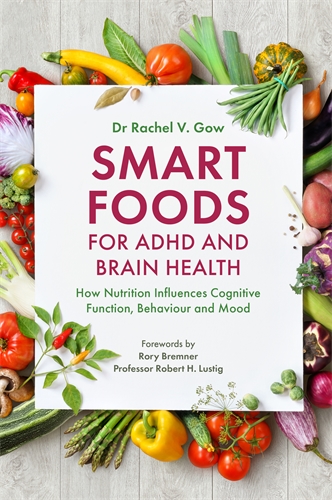Smart Foods for ADHD and Brain Health releases in February 2021.

Can you briefly outline your background?
My background and training are in the field commonly referred to as Nutritional Neuroscience or Nutritional Psychiatry. I’m also a Child Neuropsychologist and Neurodevelopmental specialist. My expertise includes a range of mental health conditions, particularly Attention Deficit Hyperactivity (ADHD) and associative learning and behaviour differences. Additionally, I’m a qualified Registered Nutritionist (under the category of Science).
I conducted my PhD training at The Institute of Psychiatry, King’s College London in the Department of Child and Adolescent Psychiatry. While there, I worked on a clinical research project investigating blood measures of omega-3 fatty acids and assessments of brain function using EEG and Event Related Potentials in children/adolescents with and without ADHD.
Also, I have a Master of Science in Psychological Research Methods (Distinction) from Birkbeck University of London. My under-graduate Psychology degree was awarded First Class with Honors from the University of Kingston, London, accredited also by the British Psychological Society.
I provide academic supervision to students all over the world. I also lecture in Psychology, teaching undergraduate and post-graduate students the role of nutrition in child development, mood and behavior. Additionally, I currently hold an honorary role at The Institute of Psychiatry, King’s College London.
My clinical research experience has integrated multiple modalities including functional and structural magnetic resonance imaging, neuropsychological assessment, genetic sequencing and nutrition/biochemistry in child/adolescent and adult clinical populations.
During my post-doc at the National Institutes of Health (NIH) in Bethesda, Maryland, U.S I was the Lead Associate Investigator of the Neuroimaging, Omega‐3 and Reward in Adults with ADHD (NORAA) trial. This study was the first randomized, double‐blind, placebo‐controlled, clinical trial globally to test the effects of omega‐3 fats in the brain activity of adults with ADHD using neuroimaging techniques.
What was your initial inspiration for Smart Foods for ADHD and Brain Health?
For me, my son is the inspiration and driving force behind my 14-year academic journey and in writing this book. Life as a young, first-time mum took an unexpected path when it became apparent that my five-year-old little boy had symptoms of hyperactivity and impulsivity. The years that followed were tough. Our journey took us to many professionals, trying allergy tests, diets, methylphenidate to vitamin supplements, and every after-school activity imaginable. Some of these activities and interventions helped, but what stood out the most for us was changing his diet.
This book is a sizeable reflection of the knowledge I have accumulated over the years during my career change from real estate agent to neuroscientist and of course, in my personal role as a mother. During this time, I acquired expertise in ADHD, related behavioural differences and the knowledge that food actually affects your brain function! I first learned by experimenting with foods at home, and then professionally during my academic career, that there are ‘brain- selective’ nutrients which are critical for the functioning of our brain and help improve learning, mood and behaviour. When we eat smart and exercise, we feel great! Making nutritional changes is entirely within your reach as an individual. It can also be a game-changer for overall health and happiness!
When a child is given a label of “special educational needs” by a clinician, almost instantly an entirely new language needs to be acquired – the language of disabilities and individual educational plans. There are few directional sign-posts; parents often find themselves on a type of emotional rollercoaster interchanging between hope and despair. I like to take comfort and remind myself and others that special children are given to special parents, a belief I subscribe to when taking off my scientific hat.
Because of quarantine, many families are working and attending school from home, which presents some unique challenges. How can Smart Foods for ADHD and Brain Health help parents who may be looking for additional support and resources?
First and foremost, I am hoping that Smart Foods for ADHD and Brain Health will remind all parents of neurodiverse children that they are not alone. It shares some of my personal but relatable experiences surrounding parenting and the difficulties and challenges we face raising a child with neurodevelopmental differences. Following that are practical and easy to follow solutions as well as a nutrition guide and delicious recipes for all the family. Importantly, my book provides a wealth of contributions from not only leading global experts working in the field of mental health but also from individuals living with diagnostic labels and stories from like-minded parents.
Lockdown indeed presents us with a range of novel challenges. From isolation to increased risk of poor mental health to the development of addictions, including the propensity to snack on junk, processed, sugar-rich “comfort” foods. This can then cause brain fog, impaired concentration, fatigue caused by sugar highs and lows, and fluctuations in mood. My book, therefore, aims to teach everyone how certain foods can help optimise cognitive function, elevate mood and switch on attention which should be helpful to frustrated parents and children alike. It also highlights the synergistic roles of both nutrition and exercise and how these help the brain release endorphins (our bodies natural antidepressants) and neurotransmitters serotonin and dopamine which keep our mood and wellbeing in check!
ADHD in children has a high comorbidity rate with ASD, which can come with some food sensitivities. Do you have any advice for parents who are also dealing with picky eaters?
Smart Foods for ADHD and Brain Health devotes a chapter to food intolerances and sensitivities, as well as explaining the impact of nutritional insufficiencies, how to test for them and importantly how to correct them.
Also, I have personally observed multiple nutrient insufficiencies in the children I have worked with and tested. Nutrients such as Vitamins, minerals and omega-3 essential fatty acids are all brain-essential, and I’ve seen a significant lack in children with ADHD and ASD. Clinical research has also investigated the effects of food additives on children’s hyperactive behaviour. For example, McCann et al. (2007) conducted a randomized, placebo-controlled clinical trial and demonstrated that artificial colours or a sodium benzoate preservative (or both) had a significant adverse effect for all the age groups when compared against the placebo group (McCann et al. 2007). Many of the behavioural reactions resembled symptoms one would expect to observe in a child diagnosed with ADHD.
Additionally, information can be found in Chapter 2, which 2 is dedicated to the Gut-Brain axis connection. Explained simply, this is a bi-directional relationship between the brain and the gut, and how the health of one affects the other.
“We now know, for instance, that our stomachs make a high percentage of the chemical required for our happiness – serotonin –transported via a special route called the vagus nerve directly into our brain. The gut is often referred to as our second brain.“
Furthermore, the environment of the gut can have effects on learning, memory, mood and stress responses – all factors in ADHD and ASD conditions. Gut bacteria are referred to collectively as the gut microbiome and directly shape who we are, impacting our learning, memory, mood and stress response, not to mention appetite. When we are not feeding our gut healthy food we increase risk for a condition called leaky gut syndrome which negatively impacts our ability to absorb nutrients due to damage to the lining of the intestinal tract. The good news is this can be healed and my book teaches the reader how.
Nutrition is not a miracle cure and there are always other factors at play when evaluating your child’s behaviour. However, nutrition is the single most instantaneously modifiable factor and my book aims to be your guide.
What is your favorite part of the book?
The original manuscript of Smart Foods for ADHD and Brain Health was almost double the size and had to be reduced significantly for publication purposes—I think that testifies to my passion and interest in this topic! I have dedicated my life to this field because I am so passionate about the role of nutrition in brain health. I further hope to create awareness to bring about much needed change in the future, especially regarding equality in education for neurodiverse children, simultaneous referrals to dieticians and nutritionists when an individual is presenting with a mental health condition, and much needed changes for dietary advice in relation to mental health, food labelling and policy. There is no one favorite part as such. I have more to say so very much hope to publish another book in the near future!
I often feel that it is a great disservice that we still overlook the role of nutrition in brain health. Even in the 21st century, nutrition is often addressed from the neck down, in terms of the prevention of premature diseases such as Type 2 diabetes, obesity, cardiovascular disease and so on, and while nutrition can help reduce risk of all of these it most definitely also plays a fundamental role in the health of our brains!
I think what is most brave and heartfelt is the devotion of parents to their children, those who struggle on a daily basis to cope with symptoms and all the clinicians, researchers and professionals dedicated to improving the lives of those with neurodiversities. This book provides stories from all of the aforementioned: stories of hope, triumph in spite of adversity and the very real knowledge that positive change is entirely within your reach. Picking up this book, is definitely a smart choice!
Do you have any additional comments?
I’m extremely grateful many of my favourite people also contributed towards this book. I express my sincere gratitude to contributions from: Professor(s) Robert Lustig, John Stein, Michael Crawford, Margaret Rayman, Robert McNamara and Dr(s) James Dick and Sarah Bath; those in the public eye who have first-hand experience of these differences: British Comedian, Rory Bremner, Actors: Carrie and her daughter Olivia Grant, Robert Picardo; the non-profit organization – Think Through Nutrition; Wiley’s Finest Organic Oils; Child Psychiatrist, Dr Richard Soppitt; Parent stories by Lauren Gale, Carly Jordan and Chris Reid; personal experiences of living with ADHD/ADD by Robyn Silber and Mike Pickets; Chiltern Way Academy Trust and all the amazing recipes provided by celebrity chefs Rick Stein and Tom Kerridge as well as Adrian Luckie, Mama’s Jerk London, Randy Hartnell and the team at Vital Choice. In addition, Amy Lancaster Owen and the wonderful team at JKP.
Do you have any other recommended resources?
My social media links contain a wealth of information, research and support for parents, professionals and individuals alike:

www.nutritiousmindsconsulting.com
Instagram: @nutritious_minds
facebook.com/DrRachelVGow
twitter: @drrachelvgow
https://thinkthroughnutrition.org
https://www.friendsofquinn.com
Other useful links:
- Do Something Different
- The Alliance for Natural Health USA
- The Alliance for Natural Health Europe
- The Amy Winehouse Foundation
- The Feingold Association
- The All Parliamentary Food and Health Forum (FHF)
- Sane – UK health charity
- The Soil Association